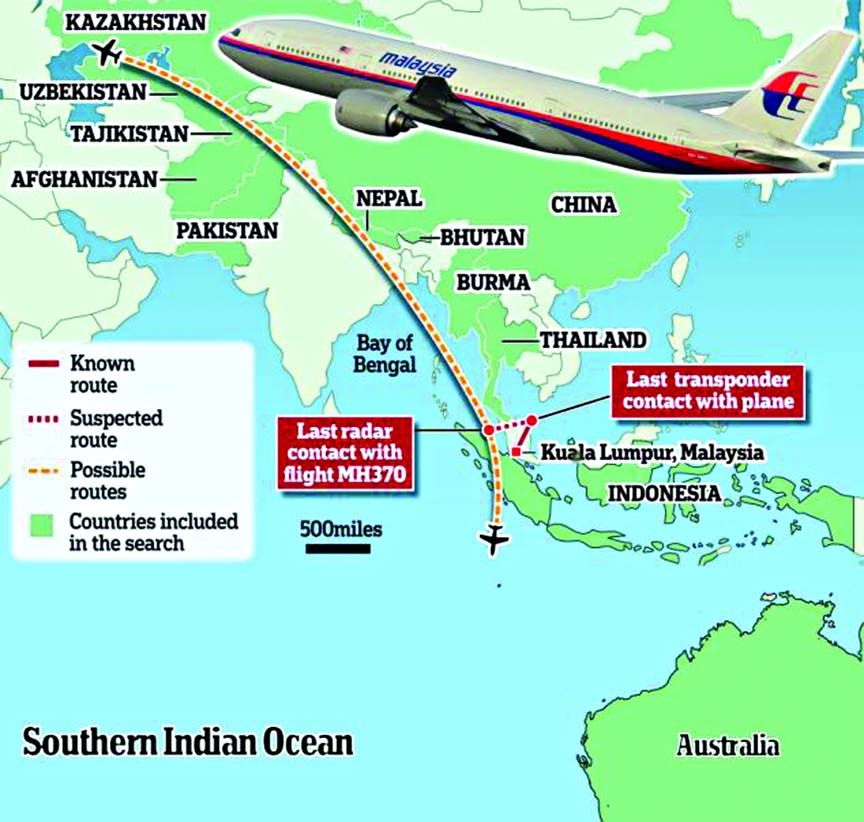
Reuters, Kuala Lumpur :
The co-pilot of a missing Malaysian jetliner spoke the last words heard from the cockpit, the airline’s chief executive said on Monday, as investigators consider suicide by the captain or first officer as one possible explanation for the plane’s disappearance.
No trace of Malaysia Airlines Flight MH370 has been found since it vanished on March 8 with 239 people aboard. Investigators are increasingly convinced it was diverted perhaps thousands of miles off course by someone with deep knowledge of the Boeing 777-200ER and commercial navigation.
A search unprecedented in its scale is now under way for the plane, covering a area stretching from the shores of the Caspian Sea in the north to deep in the southern Indian Ocean.
Airline chief executive Ahmad Jauhari Yahya also told a news conference that it was unclear exactly when one of the plane’s automatic tracking systems had been disabled, appearing to contradict the weekend comments of government ministers.
Suspicions of hijacking or sabotage had hardened further when officials said on Sunday that the last radio message from the plane – an informal “all right, good night” – was spoken after the system, known as “ACARS”, was shut down.
“Initial investigations indicate it was the co-pilot who basically spoke the last time it was recorded on tape,” Ahmad Jauhari said on Monday, when asked who it was believed had spoken those words.
That was a sign-off to air traffic controllers at 1.19 a.m., as the Beijing-bound plane left Malaysian airspace.
The last transmission from the ACARS system – a maintenance computer that relays data on the plane’s status – had been received at 1.07 a.m., as the plane crossed Malaysia’s northeast coast and headed out over the Gulf of Thailand.
“We don’t know when the ACARS was switched off after that,” Ahmad Jauhari said. “It was supposed to transmit 30 minutes from there, but that transmission did not come through.”
Police and a multi-national investigation team may never know for sure what happened in the cockpit unless they find the plane, and that in itself is a daunting challenge.
Satellite data suggests it could be anywhere in either of two vast corridors that arc through much of Asia: one stretching north from Laos to the Caspian, the other south from west of the Indonesian island of Sumatra into the southern Indian Ocean west of Australia.
China, which has been vocal in its impatience with Malaysian efforts to find the plane, called on its smaller neighbor to “immediately” expand and clarify the scope of the search. About two-thirds of the passengers aboard MH370 were Chinese.
Australian Prime Minister Tony Abbott said he had spoken to Malaysian counterpart Najib Razak by telephone, and had offered more surveillance resources in addition to the two P-3C Orion aircraft his country has already committed.
“He asked that Australia take responsibility for the search in the southern vector, which the Malaysian authorities now think was one possible flight path for this ill-fated aircraft,” Abbott told parliament. “I agreed that we would do so.”
Malaysian Acting Transport Minister Hishammuddin Hussein said diplomatic notes had been sent to all countries along the northern and southern search corridors, requesting radar and satellite information as well as land, sea and air search operations.
The Malaysian navy and air force were also searching the southern corridor, he said, and US P-8A Poseidon surveillance aircraft were being sent to Perth, in Western Australia, to help scour the ocean.

